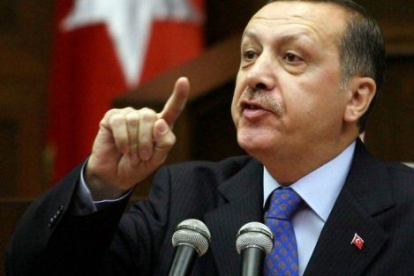IMAN Chairman: 'Turkey needs to be held to account'
Sábado, 29 Noviembre 2014
Islamic State group attacks Kobani from Turkey
ASSOCIATED PRESS
The Islamic State group launched an attack Saturday on the Syrian border town of Kobani from Turkey, a Kurdish official and activists said, although Turkey denied that the fighters had used its territory for the raid.
The Islamic State group "used to attack the town from three sides," Khalil said. "Today, they are attacking from four sides."
Turkey, while previously backing the Syrian rebels fighting to topple President Bashar Assad in that country's civil war, has been hesitant to aid them in Kobani because it fears that could stoke Kurdish ambitions for an independent state.
A Turkish government statement on Saturday confirmed that one of the suicide attacks involved a bomb-loaded vehicle that detonated on the Syrian side of the border. But it denied that the vehicle had crossed into Kobani through Turkey, which would be a first for the extremist fighters.
"Claims that the vehicle reached the border gate by crossing through Turkish soil are a lie," read the statement released from the government press office at the border town of Suruc. "Contrary to certain claims, no Turkish official has made any statement claiming that the bomb-loaded vehicle had crossed in from Turkey."
"The security forces who are on alert in the border region have ... taken all necessary measures," the statement continued.
Associated Press journalists saw thick black smoke rise over Kobani during the attack. The sound of heavy gunfire echoed through the surrounding hills as armored vehicles took up positions on the border. The Observatory said heavy fighting also took place southwest of the town where the Islamic State group brought in tanks to reinforce their fighters.
Mustafa Bali, a Kobani-based activist, said by telephone that Islamic State group fighters have taken positions in the grain silos on the Turkish side of the border and from there are launching attacks toward the border crossing point. He added that the U.S.-led coalition launched an airstrike Saturday morning on the eastern side of the town.
"It is now clear that Turkey is openly cooperating with Daesh," Bali said, using the Arabic acronym for the Islamic State. Later in the day, he said the situation was relatively calm on the border after a day of heavy clashes.
The Islamic State group claimed three suicide attacks in Kobani's border crossing point, the SITE Intelligence Group reported. The group, quoting Twitter accounts linked to the militants, said the suicide attacks were carried out by a Saudi and a Turkmen, adding that one of them was driving a Humvee.
The Islamic State group began its Kobani offensive in mid-September, capturing parts of the town as well as dozens of nearby villages. The town later became the focus of airstrikes by the U.S.-led coalition against the militants.
Kurdish fighters slowly have been advancing in Kobani since late October, when dozens of well-armed Iraqi peshmerga fighters joined fellow Syrian Kurds in the battles. The fighting has killed hundreds of fighters on both sides over the past two months.
The Observatory said Saturday the latest fighting killed at least eight Kurdish fighters and 17 jihadis.
Syria's Foreign Minister said in a television interview aired Friday night that the U.S.-led coalition's weeks of airstrikes against militants in Syria had not weakened the Islamic State group. Washington and the U.N. Security Council "should force Turkey to tighten control" of its border in order to help defeat militants, he added.
"Is Daesh today, after two months of coalition airstrikes, weaker? All indications show that it is not weaker," al-Moallem told Beirut-based Al-Mayadeen TV.
The Islamic State group has declared a self-styled Islamic caliphate in areas under its control in Iraq and Syria, governing it according to its violent interpretation of Shariah law. The group has carried out mass killings targeting government security forces, ethnic minorities and others against it.
Responding to the news, IMAN Chairman, Ribal Al-Assad said:
"I am very concerned to hear of this recent attack against Kobani which raises serious questions that Turkey has to answer.
It has been abundantly clear that for the past three and a half years Turkey has been supporting Islamic extremist groups such as IS, Al-Nursa, The Muslim Brotherhood and others.
These groups are responsible for a horrific amount of atrocities; they have and continue to slaughter all those who do not share their perverted ideology and they have executed a multitude of religious and ethnic minority groups in Syria, Iraq and Lebanon. Christians, Shias, Alawites, Yazidis, Druze, Ismailis, Kurds, Armenians and many others have fallen victim to extremist violence.
This must stop and Turkey must be held to account for the part it has played in supporting the violence.
The international community must think very hard in calling Turkey an ally, especially after this recent attack, perpetrated from Turkish soil; it also raises serious concerns over the Turkish membership of NATO.
It is high time that action is taken on this matter."